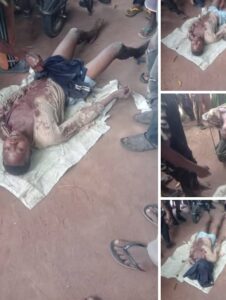See the Number of Victim killed as Jukun Militant Attack Tiv Community
See the Number of Victim killed as Jukun Militant Attack Tiv Community
The body of the victim killed in the attack by Jukun militias

Taraba/Benue, Nigeria, A series of violent attacks attributed to suspected Jukun militias have left multiple individuals dead and thousands displaced in the latest escalation of communal conflict in Nigeria’s Middle Belt region. The long-standing tensions between the Jukun and Tiv ethnic groups have once again erupted into violence, affecting communities in both Taraba and Benue States.
Recent Incidents of Violence
One of the most recent incidents occurred in Rafin Kada, a town in Wukari Local Government Area of Taraba State. According to local sources, suspected Jukun militants launched an attack from neighboring Benue State, killing several residents and setting numerous homes ablaze. The attack has forced many residents to flee the town for safety.
In Benue State, the community of Jootar in Ukum Local Government Area came under attack in December 2024. Armed individuals, believed to be affiliated with Jukun militia groups, reportedly killed at least three people and destroyed more than 1,000 homes. Crops were also razed in the assault, contributing to the humanitarian crisis in the area.
Another deadly incident was recorded in Tsondi village, located in the Wukari Local Government Area of Taraba State. In a pre-dawn raid, six individuals—including an elderly woman—were reportedly killed. The attackers, suspected to have come from nearby villages in Benue State, also set fire to homes and injured several others.
A Protracted Conflict
The Jukun-Tiv conflict is rooted in decades-long disputes over land ownership, political representation, and ethnic identity. The latest wave of violence has exacerbated existing tensions and underscored the fragile nature of peace in the region.
Humanitarian organizations and civil society groups have called on both state and federal authorities to intervene decisively to prevent further bloodshed and displacement. There are also renewed appeals for dialogue and reconciliation between the two communities to address the underlying causes of the conflict.
TRENDING SONGS
 NPMA Appeals to Nigerian Government for Compensation After Lagos Market Fire
NPMA Appeals to Nigerian Government for Compensation After Lagos Market Fire
 Rest Every Four Hours, FRSC Issues Safety Guide for Fasting Motorists
Rest Every Four Hours, FRSC Issues Safety Guide for Fasting Motorists
 NNPC Boss Ojulari Bags UK Energy Institute Fellowship
NNPC Boss Ojulari Bags UK Energy Institute Fellowship
 Shock in Anambra: Bride Disappears Moments Before Wedding
Shock in Anambra: Bride Disappears Moments Before Wedding
 Nigerian Woman Returns ₦330 Million Accidentally Credited to Her Account
Nigerian Woman Returns ₦330 Million Accidentally Credited to Her Account
 APC Don Reach Morocco?’ VeryDarkMan Reacts to Seyi Tinubu Poster
APC Don Reach Morocco?’ VeryDarkMan Reacts to Seyi Tinubu Poster
 Bride Breaks Down in Tears as Wedding Meals Were Kept Secretly While Guests Go Home Hungry
Bride Breaks Down in Tears as Wedding Meals Were Kept Secretly While Guests Go Home Hungry
 Odogwu by Day, Robber by Night: How Marriage Joy Turned Into Tragedy
Odogwu by Day, Robber by Night: How Marriage Joy Turned Into Tragedy
 Nigerian Officials Allegedly Pocket N4–6B Weekly Through Smuggling Cartels at Seme–Badagry Border
Nigerian Officials Allegedly Pocket N4–6B Weekly Through Smuggling Cartels at Seme–Badagry Border
 Ahmad Yerima: Naval Officer to Face No Sanctions After Clash with Wike – Matawalle
Ahmad Yerima: Naval Officer to Face No Sanctions After Clash with Wike – Matawalle
Share this post with your friends on ![]()













